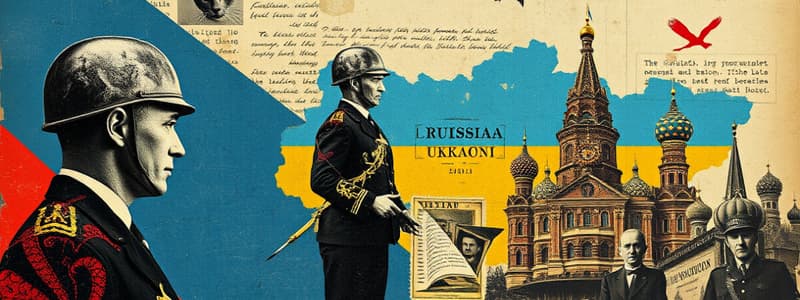Podcast
Questions and Answers
Why is Russia in a better situation than the U.S. and the West regarding the crisis over Ukraine?
Why is Russia in a better situation than the U.S. and the West regarding the crisis over Ukraine?
Russia doesn't have a timeline, can be patient, is geographically closer, and possesses military advantages including nuclear deterrence.
What impact does Ukraine's non-membership in NATO have on the crisis?
What impact does Ukraine's non-membership in NATO have on the crisis?
Ukraine will not receive military treatment from the U.S.
How does nuclear deterrence work in Russia's favor in this crisis?
How does nuclear deterrence work in Russia's favor in this crisis?
The threat of nuclear war deters U.S. military involvement.
How does the press misinterpret President Obama's statement about 'not having a strategy to combat the ISIS threat'?
How does the press misinterpret President Obama's statement about 'not having a strategy to combat the ISIS threat'?
What is the interrelationship between the threat from ISIS and other potential threats to U.S. interests?
What is the interrelationship between the threat from ISIS and other potential threats to U.S. interests?
What is foreign policy?
What is foreign policy?
What are the aspects of foreign policy?
What are the aspects of foreign policy?
What are FP targets?
What are FP targets?
What is FP designed to influence?
What is FP designed to influence?
Who are the main foreign policy actors within the executive branch?
Who are the main foreign policy actors within the executive branch?
Flashcards are hidden until you start studying
Study Notes
Russia and the Ukraine Crisis
- Russia benefits from a lack of urgency in decision-making, allowing a patient approach to the Ukraine crisis.
- U.S. military options and economic sanctions are limited or less effective in deterring Russian actions.
- Geographic proximity enables Russia to respond swiftly to developments in Ukraine.
- Russia promotes a nationalist narrative advocating for the rights of ethnic Russians in Ukraine.
- The Russian military presents a significant force and possesses nuclear weapons, creating a deterrent dynamic against U.S. intervention.
Ukraine's NATO Status and Geopolitical Implications
- Ukraine's absence from NATO means it does not receive military support from the U.S. in conflicts.
- Estonia and Latvia, both NATO members, share geographic and historical ties to Ukraine as part of Russia's influence and former Soviet Union membership.
- Russia exercises substantial political and military pressure in the region due to these historical ties.
Nuclear Deterrence
- Russia’s extensive nuclear arsenal poses a genuine threat, potentially deterring U.S. military involvement.
- The fear of escalating to nuclear conflict plays to Russia’s advantage in the crisis.
Misinterpretation of Obama on ISIS Strategy
- President Obama's comments about lacking a strategy against ISIS were taken out of context by critics.
- His statement specifically addressed the challenge of forming a strategy for U.S. action against ISIS in Syria without unintentionally aiding Assad’s regime.
- Emphasis on the need for a dual military and political response to ISIS.
Complexities Surrounding ISIS Threat
- ISIS is a primary national security concern, but military action could inadvertently strengthen unwanted actors such as Assad.
- Al Qaeda views ISIS as excessively radical, complicating the response landscape.
- Congressional Republicans leverage this situation to criticize President Obama's foreign policy decisions through media narratives.
- Strengthening military action against ISIS could bolster Hezbollah, which is supported by Iran and Syria's Assad.
Understanding Foreign Policy
- Foreign policy encompasses the actions and statements of the U.S. government directed towards international audiences.
- It involves strategies impacting interactions with foreign entities, behaviors, and beliefs.
Key Aspects of Foreign Policy
- Foreign policy strategies affect the beliefs, capabilities, and behaviors of external audiences.
- Target audiences include other governments, international organizations, and non-state actors like citizens.
Main Actors in Foreign Policy
- Department of Defense: Manages military force; advises the president on defense matters.
- State Department: Responsible for developing and implementing foreign policy strategies.
- Treasury Department: Advises on economic policies; manages international financial relations.
- National Security Council: Coordinates national security and foreign policies across government agencies.
- Central Intelligence Agency (CIA): Gathers and analyzes intelligence.
- Director of National Intelligence: Advises the President on intelligence matters related to national security.
Studying That Suits You
Use AI to generate personalized quizzes and flashcards to suit your learning preferences.




